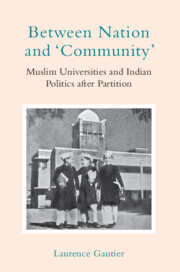Book contents
- Frontmatter
- Dedication
- Contents
- List of figures
- List of tables
- Acknowledgements
- A note on transliteration and translation
- List of abbreviations
- Introduction
- 1 A laboratory for composite India: Jamia Millia Islamia around the time of partition
- 2 Sifting Sir Syed’s legacy: From the ‘arsenal of Muslim India’ to a symbol of India’s national integration?
- 3 Re-legitimising minority rights: The campaign for Aligarh Muslim University’s minority status
- 4 Resisting minority politics, holding on to composite nationalism: Jamia Millia Islamia in the post-Nehruvian period
- 5 Uplifting backward Muslims: The new consensus?
- 6 Bastions of Islam: The defence of Islam as a narrative of empowerment and contestation
- 7 Women in Muslim universities: Guardians of tradition or actors of change?
- Conclusion
- Appendix
- Glossary
- Bibliography
- Index
4 - Resisting minority politics, holding on to composite nationalism: Jamia Millia Islamia in the post-Nehruvian period
Published online by Cambridge University Press: 15 April 2024
- Frontmatter
- Dedication
- Contents
- List of figures
- List of tables
- Acknowledgements
- A note on transliteration and translation
- List of abbreviations
- Introduction
- 1 A laboratory for composite India: Jamia Millia Islamia around the time of partition
- 2 Sifting Sir Syed’s legacy: From the ‘arsenal of Muslim India’ to a symbol of India’s national integration?
- 3 Re-legitimising minority rights: The campaign for Aligarh Muslim University’s minority status
- 4 Resisting minority politics, holding on to composite nationalism: Jamia Millia Islamia in the post-Nehruvian period
- 5 Uplifting backward Muslims: The new consensus?
- 6 Bastions of Islam: The defence of Islam as a narrative of empowerment and contestation
- 7 Women in Muslim universities: Guardians of tradition or actors of change?
- Conclusion
- Appendix
- Glossary
- Bibliography
- Index
Summary
The campaign for AMU's minority status propelled the university to the forefront of Muslim politics in the 1960s and 1970s, making AMU's status one of the key ‘Muslim issues’ of the period. By pressing for the recognition of Muslims’ minority rights, the campaign revealed the limits of the so-called Nehruvian consensus. It highlighted the difficulty of transcending religion-based differences in a context where notions of majority and minority continued to mediate conceptions of the nation—among the population as well as among state actors—and to shape state policies on the ground.
Yet the demands for religious minority rights continued to suffer from a ‘justificatory deficit’: many state actors continued to see them as threats to the nation's unity and to its secular Constitution. In this context, Muslim groups at AMU and JMI sought alternative, more legitimate discursive frameworks to claim support from the state and to defend their conceptions of the nation and citizenship. The following chapters will examine the different discursive frameworks that emerged within and around Muslim universities in response to the rise of minority politics in the post-Nehruvian period. In this way, the book questions the simplistic notion that secular nationalist politics gradually gave way—from the 1960s onwards—to communal identity-based politics. To start with, the book has shown in the preceding chapters that there was no consensus around the secular nationalist discourse, even under Nehru. The next chapters will highlight the different forms of resistance to minority politics that developed within Muslim universities in the subsequent period. These resistances did not usually come from a purely areligious standpoint. As we will see, they often stemmed from competing—yet sometimes overlapping— understandings of Muslim identity. We may argue, drawing inspiration from Barbara Metcalf, that Indian Muslimness ‘offered a wide range of orientations, not one single stance’. The comparison between AMU and JMI further allows us to highlight differences of rhythm in the evolution of the dominant discursive frameworks in these two institutions. Muslim politics was neither monolithic nor did it unfold in a homogeneous time. One therefore has to bear in mind the differences in institutional cultures, proximity to power, regional anchorage and visibility in the public sphere to account for the diachronic evolutions at AMU and JMI.
- Type
- Chapter
- Information
- Between Nation and ‘Community'Muslim Universities and Indian Politics after Partition, pp. 189 - 228Publisher: Cambridge University PressPrint publication year: 2024

